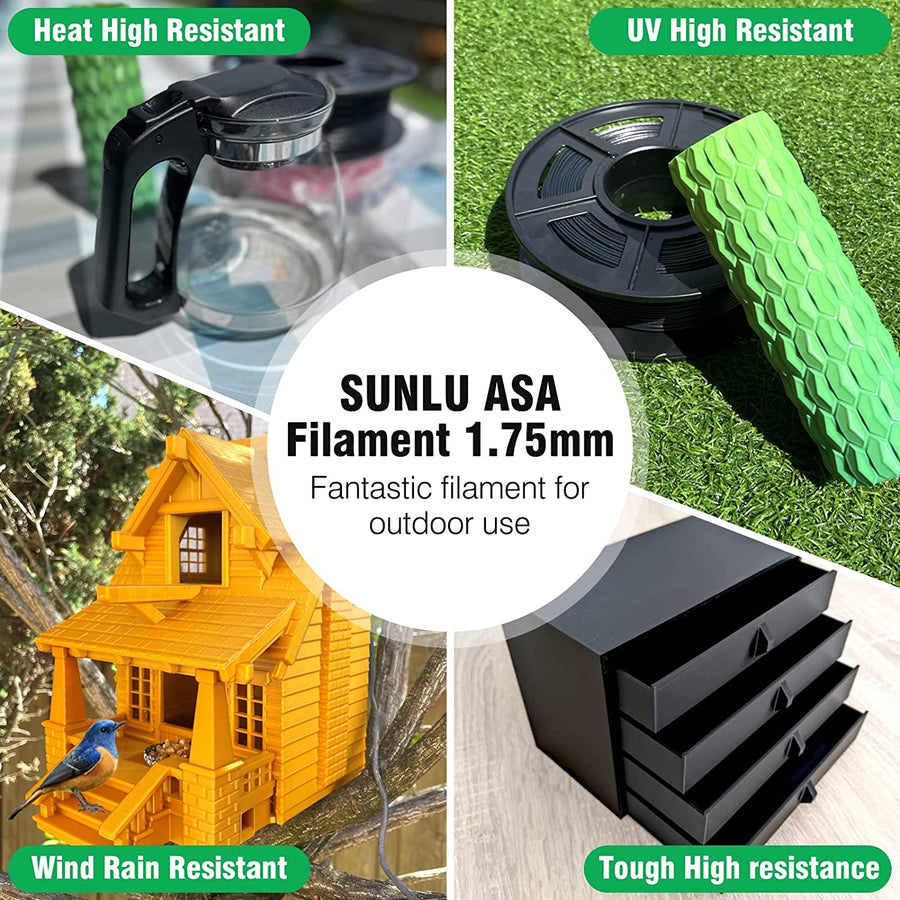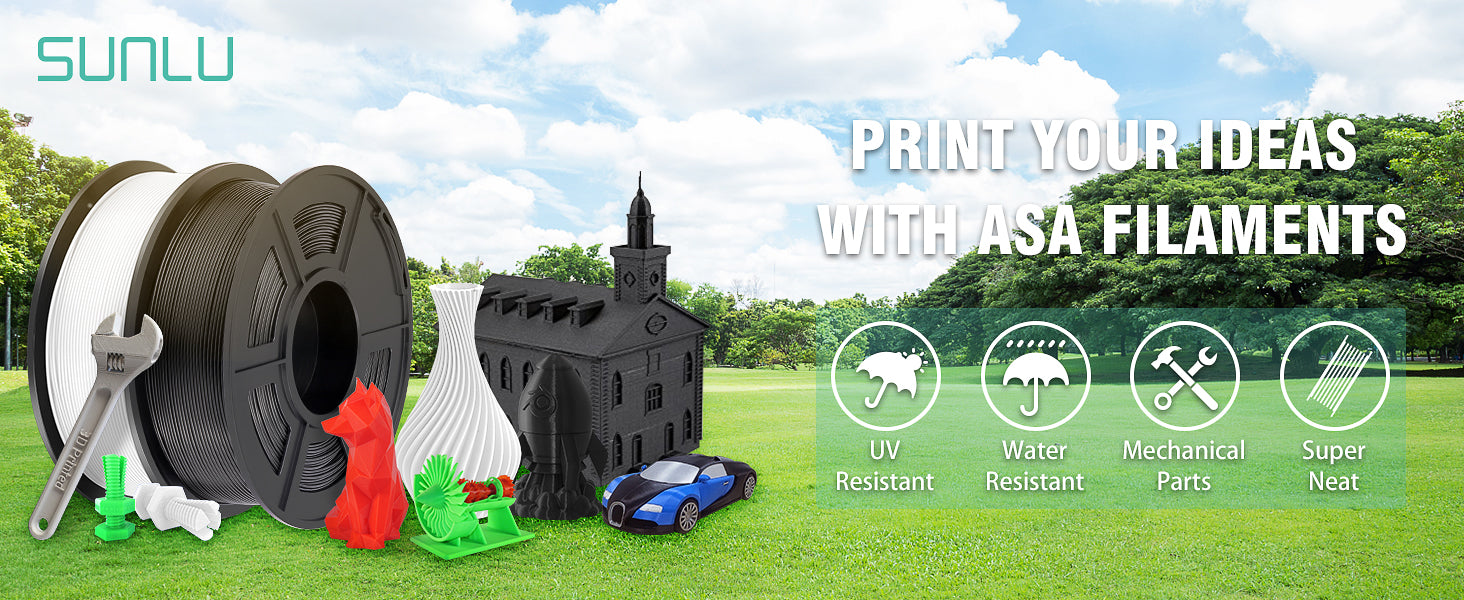The strong features of ASA Filament
As 3D printing continues to revolutionize various industries, it is important to explore the different materials available to maximize the full potential of this technology. One such material is ASA filament, which offers numerous advantages over other commonly used filaments, such as PLA and ABS. ASA filament, like the popular Sunlu brand, combines the strength and durability of ABS with excellent weather resistance and UV stability. In addition, ASA filament can be further enhanced through the use of vapor smoothing techniques, resulting in a smooth and polished finish on 3D printed objects. To discover the benefits of ASA filament and how it can elevate your 3D printing projects, read on!
The Advantages of ASA Filament for 3D Printing
ASA filament offers several advantages that make it an ideal material for 3D printing projects.

Firstly, ASA filament is known for its exceptional durability and strength, making it suitable for creating functional and long-lasting objects. Unlike other filaments that may crack or break under stress, ASA filament can withstand impact and resist deformation, ensuring the longevity of the printed parts.
Secondly, ASA filament is highly resistant to weather conditions and UV rays. This feature makes it an excellent choice for outdoor applications, where exposure to sunlight and changing temperatures could degrade the quality of other filaments. ASA-printed objects can maintain their structural integrity and color vibrancy even when subjected to harsh environmental conditions.
Lastly, ASA filament can be easily post-processed through vapor smoothing techniques. This process involves using acetone vapor to smooth out the surface of printed objects, resulting in a glossy and polished appearance. This feature not only enhances the aesthetics of the printed parts but also improves their overall quality and finish.
In the upcoming sections, we will delve deeper into these advantages and explore additional benefits of using ASA filament for your 3D printing projects. Stay tuned to discover how ASA filament can take your creations to the next level!
Durability and Outdoor Use
In this section, we will focus on two specific advantages of ASA filament: its durability and suitability for outdoor use.

One of the key benefits of ASA filament is its exceptional durability and strength. When compared to other filaments, ASA stands out for its ability to withstand impact and resist deformation. This makes it an ideal material for creating functional and long-lasting objects. Whether you're printing mechanical parts or prototypes that require high strength, ASA filament will not disappoint.
Additionally, ASA filament is highly resistant to weather conditions and UV rays. This feature makes it an excellent choice for outdoor applications. Unlike other filaments that may degrade or lose color vibrancy when exposed to sunlight and changing temperatures, ASA-printed objects can maintain their structural integrity and appearance. This durability and resistance to environmental factors make ASA filament perfect for creating outdoor signage, protective covers, and parts for outdoor equipment.
Impact Resistance
Another significant benefit of ASA filament is its exceptional impact resistance. ASA-printed objects are known for their ability to withstand high levels of stress and force without cracking or breaking. This makes ASA filament a popular choice for creating functional parts and components that need to endure rigorous use.
Whether you're designing tools, machinery parts, or prototypes, using ASA filament ensures that your printed objects can withstand heavy-duty applications and repetitive use. The impact resistance of ASA filament allows for reliable and long-lasting performance, making it a reliable option for industrial and mechanical applications.
Furthermore, the impact resistance of ASA filament opens up possibilities for creating durable and robust objects in various industries, such as automotive, aerospace, and engineering. From manufacturing components to intricate design prototypes, ASA filament provides the strength and resilience required for demanding applications.
Chemical Resistance
ASA-printed objects are resistant to a wide range of chemicals, including alcohols, acids, oils, and UV radiation. This makes ASA filament an ideal choice for applications where the printed objects may come into contact with harsh chemicals or outdoor environments.
The chemical resistance of ASA filament ensures that the printed objects maintain their structural integrity and functionality even in challenging conditions. This characteristic makes ASA filament suitable for a variety of industries, including automotive, marine, and medical.
Additionally, the chemical resistance of ASA filament opens up possibilities for creating functional prototypes that need to withstand exposure to different substances or for producing end-use parts for industries that require chemical resistance.
Cost-Effectiveness
Aside from its excellent chemical resistance, ASA filament also offers cost-effectiveness, making it a practical choice for 3D printing projects.
Compared to other materials such as ABS, ASA filament delivers similar qualities and performance at a lower cost. This affordability factor makes ASA filament an attractive option for businesses and individuals looking to save on their 3D printing expenses.
Moreover, ASA filament is known for its durability and long-lasting properties. Its resistance to UV radiation ensures that printed objects retain their strength and color even when exposed to prolonged sunlight. This extended lifespan reduces the need for frequent replacements, ultimately resulting in cost savings over time.
Conclusion: Harnessing the Power of ASA Filament
ASA filament offers a range of benefits for 3D printing projects. In addition to its cost-effectiveness, ASA filament is known for its durability and resistance to UV radiation. This makes it an ideal choice for businesses and individuals looking to save on their 3D printing expenses and reduce the need for frequent replacements.
By harnessing the power of ASA filament, users can create long-lasting, high-quality printed objects that retain their strength and color even when exposed to prolonged sunlight. This extended lifespan not only saves money but also ensures the longevity of the printed items.
In conclusion, ASA filament is a practical, cost-effective solution that can unleash the full potential of 3D printing. Its excellent chemical resistance, affordability, and durability make it a standout material for various applications. By utilizing ASA filament, businesses and individuals can achieve impressive results while maximizing their investment in 3D printing technology.
FAQ
1.Is ASA stronger than PLA?
Yes, ASA has similar mechanical properties to ABS, so it is much stronger than PLA. It is more resilient and tough than PLA. Its impact resistance, strength, and temperature resistance are much better than PLA.
2.Is ASA harder to print than ABS?
No, the glass transition temperature of ASA is actually lower than that of ABS. However, the recommended 3D printing temperature for ASA is about 5°C higher than for ABS. As a result, ASA 3D prints tend to warp less easily in comparison to ABS 3D prints.
3.Is ASA hard to print?
Yes, ASA need high temp to 3D print than many other 3D printer filaments. You should better 3D print it by a 3D printer with heated chamber.
4.Is ASA stringy like PETG?
No, ASA filament is not a easy string filament.
